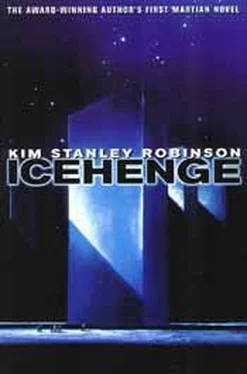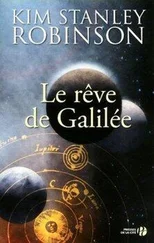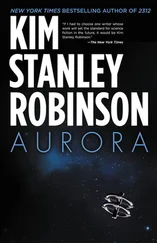Kim Robinson - Icehenge
Здесь есть возможность читать онлайн «Kim Robinson - Icehenge» весь текст электронной книги совершенно бесплатно (целиком полную версию без сокращений). В некоторых случаях можно слушать аудио, скачать через торрент в формате fb2 и присутствует краткое содержание. Год выпуска: 1998, ISBN: 1998, Издательство: Orb Books, Жанр: Космическая фантастика, на английском языке. Описание произведения, (предисловие) а так же отзывы посетителей доступны на портале библиотеки ЛибКат.
- Название:Icehenge
- Автор:
- Издательство:Orb Books
- Жанр:
- Год:1998
- ISBN:0312866097
- Рейтинг книги:4 / 5. Голосов: 1
-
Избранное:Добавить в избранное
- Отзывы:
-
Ваша оценка:
- 80
- 1
- 2
- 3
- 4
- 5
Icehenge: краткое содержание, описание и аннотация
Предлагаем к чтению аннотацию, описание, краткое содержание или предисловие (зависит от того, что написал сам автор книги «Icehenge»). Если вы не нашли необходимую информацию о книге — напишите в комментариях, мы постараемся отыскать её.
contains elements that should be familiar to readers of the Mars series. Extreme human longevity, Martian revolution, historical revisionism, and shifts between primary characters are all present.
Icehenge
Icehenge — читать онлайн бесплатно полную книгу (весь текст) целиком
Ниже представлен текст книги, разбитый по страницам. Система сохранения места последней прочитанной страницы, позволяет с удобством читать онлайн бесплатно книгу «Icehenge», без необходимости каждый раз заново искать на чём Вы остановились. Поставьте закладку, и сможете в любой момент перейти на страницу, на которой закончили чтение.
Интервал:
Закладка:
During my second year there I met Oleg Davydov. He was staying in Burroughs, the big government center to the north, doing some work for the Soviet mining cartel. We met in a restaurant, introduced by a mutual acquaintance.
He was tall and bulky, a handsome man. One of the Soviet blacks, they call them. I guess some of their ancestors came from one of the USSR’s client countries in Africa. The color had been pretty well watered down over the generations, and Davydov had coffee-and-cream-colored skin. His hair was black and wooly; he had thick lips under a thin, aquiline nose; a heavy beard, shaved so that his lower face was rough; and his eyes were ice blue. They seemed to jump out of his face. So he was a pretty good racial mix. But on Mars, where ninety-nine percent of the population is fish-belly white, as they say, any touch of skin color is highly valued. It made one look so… healthy, and vital. This Davydov was really extremely good-looking, a color delight to the eye. I watched him then, as we sat on adjacent stools in that Burroughs restaurant, talking, drinking, flirting a little… watched so closely that I can recall the potted palm and white wall that were behind him, although I don’t remember a word we said. It was one of those charmed nights, when both parties are aware of the mutual attraction.
We spent that night together, and the next several nights as well. We visited the first colony in the area, The Can, and marvelled at the exhibits in the museum there. We scrambled around the base of the Fluted Cliffs in Hellespontus Montes, and spent a night out in a survival tent. I beat him easily in a footrace, and then won a 1500-meter race for him at a Burroughs track. Every hour available to us we spent together, and I fell in love. Oleg was young, witty, proud of his many abilities; he was exotically bilingual (a Russian!), affectionate, sensual. We spent a lot of time in bed. I remember that in the dark I could see little more than his teeth when he grinned, and his eyes, which seemed light grey. I loved making love with him… I remember late dinners together, in Burroughs or out at the station. And innumerable train rides, together or alone, across the sere rust deserts between Burroughs and Hellas — sitting by the window looking out at the curved red horizon, feeling happy and excited… Well, those are the kind of times that you only live through once. I remember them well.
The arguments began quite soon after those first weeks. We were an arrogant pair and didn’t know any better. For a long time I didn’t even realize that our disagreements were particularly serious, for I couldn’t imagine anyone arguing with me for very long. (Yes, I was that self-important.) But Oleg Davydov did. I can’t remember much of what we argued about — that period of time, unlike the beginning, is a convenient blur in my memory. One time I do remember (of course the rest could be called up as well): I had come into Burroughs on the late train, and we were out eating in a Greek restaurant behind the train station. I was tired, and nervous about our relationship, and sick of Hellas. Hoping to compliment him, I made some comment about how much more fun it would be to be an asteroid miner like he was.
“We aren’t doing anything out there,” he said in response. “Just making money for the corporations — making a few people on Earth rich, while everything else down there falls apart.”
“Well, at least you’re out there exploring,” I said.
He looked annoyed, an expression I was becoming familiar with. “But we aren’t, that’s what I’m saying. With our capabilities we could be exploring the whole solar system. We could have stations on the Jovian moons, around Saturn, all the way out to Pluto. We need a solar watch station on Pluto.”
“I wasn’t aware of that fact,” I said sarcastically.
His pale blue eyes pierced me. “Of course you weren’t. You think it’s perfectly all right to continue making money from those stupid asteroids, and nothing more, here at the end of the twenty-second century.”
“Well?” I said, annoyed myself by this time. “We’re all going to live for a thousand years, so what’s your rush? There’s time for all of your great projects. Right now we need those asteroids.”
“The corporations need them. And the Committee.”
“The Committee’s just organizing all of our efforts for our own good,” I said.
“They just make the trains run on time, eh?” he said, taking a deep swallow from his drink.
“Yes,” I said, not understanding what he meant. “Yes, they do.”
He shook his head with disgust. “You’re an all-American girl, all right. Everything is oh kay. Leave the politics to the others.”
“And you are a true Soviet,” I retorted, struggling away from him in our dining booth. “Blaming your problems on the government…”
And we went on from there, senselessly and for no reason but pride and hurt feelings. I remember him making a grim prediction: “They will make a happy American Kremlin up here, and you won’t care, as long as your job is secure.” But most of what we said was less logical than that.
And a long, miserable week later, a blur of bitter fights, one of those times when you have ruined a relationship though you don’t know how, and wish desperately that time could be reversed and the unknown mistake undone, he left. The Soviet mining people wanted him in space again and he just left, without saying good-bye, though I called his dorm again and again in those last few days. And then I knew — I learned it, in the course of long black walks over the broad basin, standing alone on that rocky plain — that I could be spurned. It was a hard lesson.
In a few years I was out among the asteroids myself, working for Royal Dutch. I heard stories about Davydov getting in trouble with the Soviet mining command, but I didn’t pay much attention. It was a matter of pride to ignore anything I heard about him. So I never got the full story of what had happened to him.
Then, many years later — just three years before this mutiny, in fact — the Hidalgo disappeared out in the Trojans, breaking radio contact with the famous last words, “Now wait just a minute.” No wreckage was ever found, the matter was hushed up by the Committee censors, and no explanation was ever offered. Looking over the list of crew members I saw his name at the top — Oleg Davydov — and the pain flooded through me again, worse than ever before. It was one of the worst moments of my life. We had parted in anger, he had left me without even saying good-bye, and now, no matter how many years the gerontologists gave me, I would never be able to change those facts, for he was dead. It was very sad.
…Thus, when Eric Swann came to take me across to the Hidalgo, to see Davydov again, I did not know exactly what I felt. My heart beat rapidly, I had to strain to make casual, terse conversation with Eric. What would he look like? What would I say to him, or him to me? I didn’t have the slightest idea.
Well, he looked very much like he had sixty years before. Perhaps a little heavier, bearlike with his dark hair, his broad shoulders and chest and rump. His ice-blue eyes surveyed me without any visible sign of recognition.
We were on the empty bridge of the Hidalgo. At a nod from Davydov, Eric had slipped away down the jump tube. In the breathy vented silence I walked around the bridge slowly, my velcro slippers making little rip rip rip noises. My pulse was fast. I discovered that I was still angry with him. And I felt that he had personally deceived me with the news of his death. Or perhaps it was the mutiny-
“You look much the same,” he said. The sound of his voice triggered a hundred memories. I looked at him without replying. Finally he said, with a stiff, slight smile, “Has Eric apologized for our kidnapping of you?”
Читать дальшеИнтервал:
Закладка:
Похожие книги на «Icehenge»
Представляем Вашему вниманию похожие книги на «Icehenge» списком для выбора. Мы отобрали схожую по названию и смыслу литературу в надежде предоставить читателям больше вариантов отыскать новые, интересные, ещё непрочитанные произведения.
Обсуждение, отзывы о книге «Icehenge» и просто собственные мнения читателей. Оставьте ваши комментарии, напишите, что Вы думаете о произведении, его смысле или главных героях. Укажите что конкретно понравилось, а что нет, и почему Вы так считаете.











